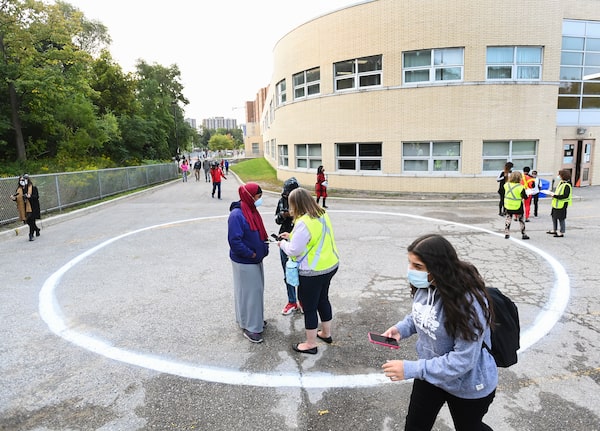
Teachers register students in physical distancing circles at Portage Trail Community School, part of the Toronto District School Board (TDSB), on Sept. 15, 2020.Nathan Denette/The Canadian Press
The Toronto District School Board on Wednesday has voted to recognize that caste oppression exists in Toronto schools and is asking the Ontario Human Rights Commission to help create a provincial framework that addresses caste discrimination and oppression.
This is believed to be the first time a school board has acknowledged the existence of caste oppression in Canada.
Caste bullying at Toronto schools prompts vote over new protected category
Toronto District School Board trustee Yalini Rajakulasingam introduced the motion on the floor, seconded by trustee Anu Sriskandarajah. While the motion had originally called for including caste as a protected category, alongside race, gender and sexuality, it was amended before being approved.
Ms. Rajakulasingam called for a partnership between the human rights commission and the TDSB to come up with a concrete definition of caste oppression and create a means to address such incidents.
Ms. Rajakulasingam said caste-oppressed people do not come forward to share their stories of oppression because there is nothing in place to deal with the problem. She said a partnership with the commission will remedy that. “There is no category to record caste [oppression]. So it is not being recorded as caste. This does not mean it is not happening,” she said during the meeting.
Referencing a recent decision by the Seattle City Council to recognize caste discrimination, she said, “In Seattle, 4 per cent of the community identify as South Asian. At the TDSB, we are at 22 per cent.”
“This motion is not about division, it’s about creating healing and empowering communities and providing them safer schools that students deserve,” Ms. Rajakulasingam said.
She added that over the last two weeks she had received letters of support from parents and from more than 100 advocacy groups.
Ms. Rajakulasingam, who is the trustee for Scarborough North, said parents who identified as members of oppressed castes told her about bullying, harassment and slurs their children faced.
A few trustees, including Weidong Pei, stood to oppose the motion. “By supporting this motion, trustees are unnecessarily dividing the South Asian community,” he said, adding that passing the motion would create more problems instead of solving them.
Chinnaiah Jangam, an associate professor at Carleton University and co-founder of the Canada-based South Asian Dalit Adivasi Network (SADAN), said: “This is a historic moment. It recognizes that caste oppression is real, and it exists in Toronto schools.”
He added that by elevating the motion to the provincial level, the TDSB has opened the doors to discussions on caste oppression everywhere and not just in schools. “The original motion was changed a bit since the school board alone could not create this kind of framework. The Ontario Human Rights Commission getting involved will open up discussion further,” he said.
The caste system is a form of hierarchal social stratification that has existed in the Indian subcontinent for several thousand years. Historically, dominant caste groups have enjoyed greater rights and social privileges vis-à-vis oppressed castes, who have been subjected to social ostracization and violence as well as being systemically excluded from certain professions.
The TDSB’s proposal had drawn sharp opposition.
A group called Canadian Organization for Hindu Heritage Education (COHHE) started a petition to stop the motion. The group said that adding caste to the list of protected identities is “Hinduphobic.” (The caste system has its roots in Hinduism but has extended to other communities.)
“There is little evidence or reports of ‘caste oppression’ in Toronto and for that matter Canada,” states the petition, which has more than 5,000 signatures. “Hence the declaration that ‘there is rise in documented anti-caste discrimination in the diaspora, including in Toronto’ makes the motion misleading, prejudiced, and lacking in integrity.”
Editor’s note: While the establishment of a working group people who identify as Dalit or caste-oppressed was part of the original motion, it was not in the final motion that was passed by the board. The story has been updated.
 Uday Rana
Uday Rana